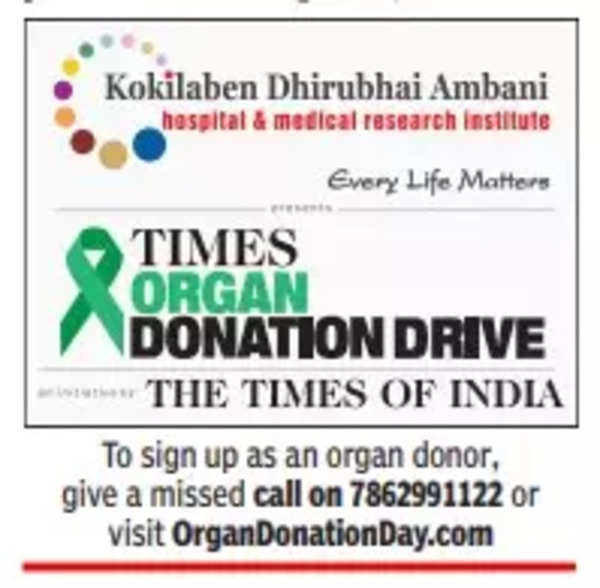“She wanted to save lives. In her passing, we find solace in the fact that she was able to fulfill that dream,” her cousin Akil said. The family donated Neha’s heart, lungs, liver, and kidneys, ultimately saving five people’s lives. Emotions ran deep on Tuesday at an event hosted by Kokilaben Dhirubhai Ambani Hospital (KDAH) in Mumbai, where Neha’s family, along with 37 other families of organ donors and recipients, were honoured. The evening also marked another significant year for the Times Organ Donation Drive—a decade-long collaborative effort between The Times of India and Kokilaben Hospital—dedicated to raising awareness about organ donation.
TOI has also worked with NGOs like Mohan Foundation and Organ India to spread the word. Referring to the donors and recipients as the ‘true heroes,’ chairperson of the hospital Tina Ambani said, “Our donors, who have provided another person a new lease of life, and our recipients, who have embraced this opportunity to lead their best lives, they are our heroes. I also salute our dedicated doctors and medical teams who make these everyday miracles possible.” She underscored the importance of donation in India, where the deceased organ donation rate has remained under one donor per million population.
Actor Anupam Kher, the chief guest at the event, was visibly moved by the inspiring stories of families who donated organs amidst the grief of losing a loved one. He said, “The parents of a three-year-old donor, a teenager who selflessly donated his father’s organs, a 32-year-old wife who chose to save the lives of strangers are the true champions of our society, and they deserve greater celebration.”
Kher said he was willing to become a permanent ambassador for organ donation given the need to bridge the gap between donors and recipients. Dr Santosh Shetty, executive director & CEO of KDAH, said as per data from the Union health ministry organ transplants in India have increased just over three-fold from 4,990 in 2013 to 16,041 in 2022. However, nearly 83% of these transplants are from living donor, where a family member donates an organ to a kin in need. But, it is ideal to have more deceased donors since that eliminates any risk associated with taking an organ from a living donor, he added.
Dr Shetty said, “Nearly three lakh people need a kidney transplant, but only 6,000 are performed,” he said, adding that every 10 minutes, a new person joins the growing list of individuals waiting for an organ transplant. More states must initiate robust donation programmes since the lead is taken by only five or six currently, including Telangana, Tamil Nadu, Karnataka, Gujarat and Maharashtra. He appreciated the work done by the zonal transplant coordination committee and the state and regional bodies in building the programme.
A silver lining, Tina Ambani said, is the rise in awareness about organ donation with myths and superstitions being debunked, and registration numbers increasing. “This is the change we have been waiting to see, and it is happening all around us,” she said. The Times of India-KDAH campaign has witnessed pledges nearing the two lakh mark over the years. Donors and recipients said it is important to dispel myths and understand how recipients lead fulfilling lives after undergoing a transplant. Sukhwinder Kaur (55) shared her story after receiving a kidney transplant in 2012. Given a second chance to live, she started running marathons and has participated in over two dozen since, starting from 2km to 42km races.
“The new organ gave me wings. I now want to fly,” she added. Bengaluru-based Varun Anand (13) was grateful to his mother for donating one of her kidneys and saving his life. He decided to up his fitness levels since the surgery and has participated in tennis, badminton, and table tennis at the World Transplant Games.
Jaya Jairam, project director of NGO Mohan Foundation, who also received a kidney from her mother 13 years ago, said that organ failure is an emotional, physical, and financial challenge for the families that transplants alleviate. The fact that even teenagers consent to donate organs of their deceased kin shows it’s time to engage youths in a big way, she added. When Shiva Prasad Shetty (47) suffered a haemorrhage and was declared brain dead, his 18-year-old son consented to donate his father’s organs. “I was astonished but immensely proud that my son felt so passionately about saving lives,” his wife Saritha said.
